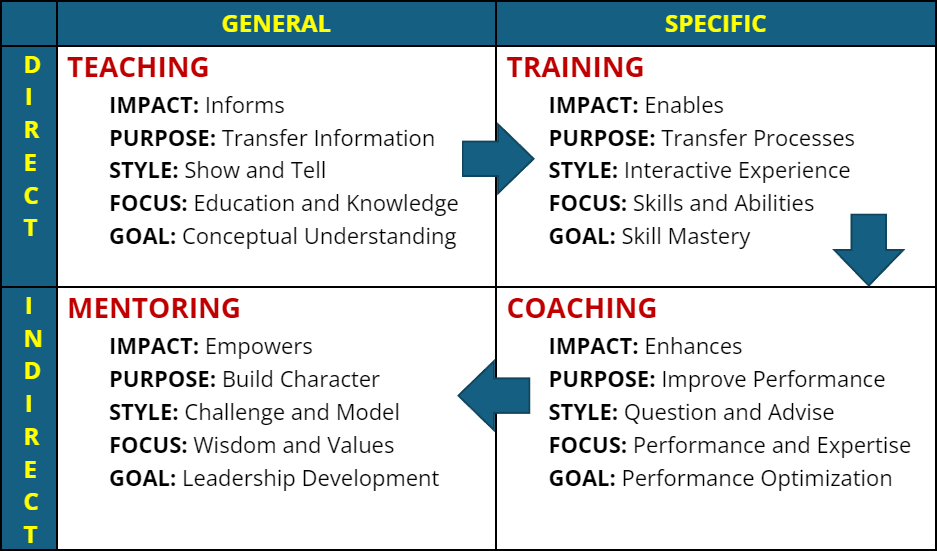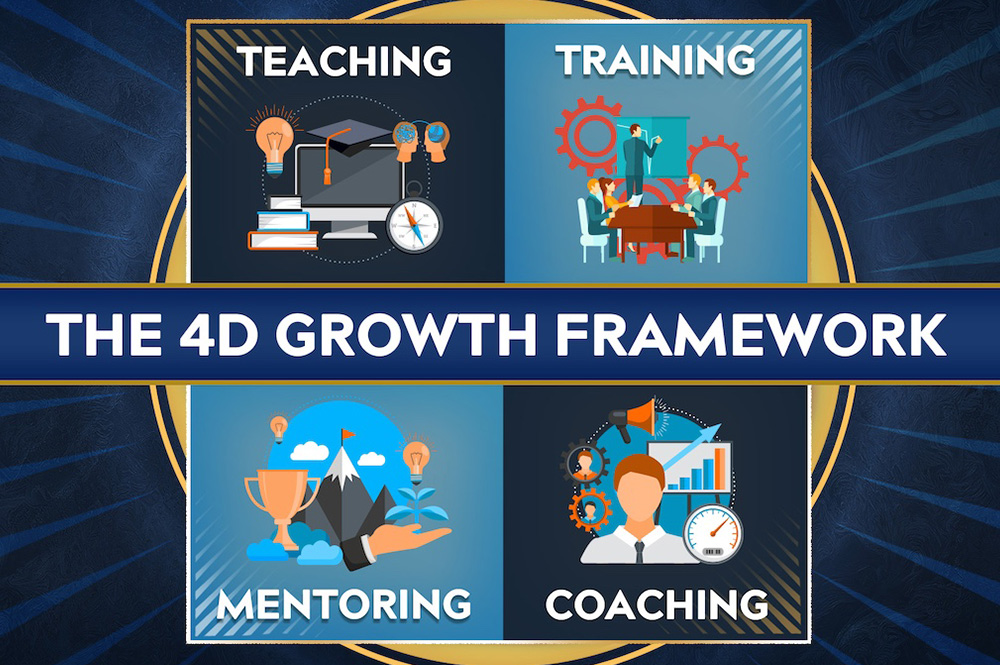In over 20 years of training and coaching leaders, I have observed four different approaches to learning, each with its own unique benefits. These four techniques—teaching, training, coaching, and mentoring—form a comprehensive framework for personal and professional development, which I call the 4D Growth Framework.
This method is a systematic approach that offers a clear path toward increasing knowledge, building skills, optimizing performance, and shaping character. By understanding the distinct role each principle plays, we can achieve greater growth both personally and within any organization, whether it be a business, ministry, or nonprofit.
The four pillars of 4D Growth are Teaching, Training, Coaching, and Mentoring. Let us explore the core elements of each.
- Teaching (Informing and Transferring Knowledge)
Teaching is the foundation of all development, centered around the transfer of knowledge. This is where the learning journey begins. Teaching provides context, perspective, and a framework for understanding. It focuses on developing the mind by exposing learners to new concepts, theories, and information. The role of teaching is critical in education, onboarding processes, and even leadership development. However, it is important to recognize that teaching by itself is conceptual and often does not include a hands-on, experiential component.For instance, you may attend a workshop on a new software system. By the end of the workshop, you will have the conceptual knowledge of how the software functions. Yet, without applying that knowledge in a real-world scenario, your understanding remains theoretical. Teaching alone often needs to be followed by practical training to ensure the application of knowledge in everyday tasks.
- Training (Building Practical Skills and Competence)
Training is where we move from conceptual learning to practical application. Unlike teaching, which transfers information, training focuses on the transfer of process. This step-by-step learning experience involves real-life application and interaction to develop actual competencies. Whether you are learning to operate new machinery, deliver a sales presentation, or improve your project management skills, training builds confidence and competence.The goal of training is to ensure that what was learned conceptually can now be performed practically. For example, after attending a workshop on the software system, training would allow you to practice using the software, running through scenarios, and solving real-world problems. Training leads to mastery of the necessary skills required to perform in your role.
- Coaching (Optimizing Performance and Refining Abilities)
Coaching takes development to the next level. While teaching and training are direct transfers of information and skills, coaching is an indirect process of refinement. A coach’s role is to draw out the potential already within an individual, asking questions that challenge assumptions and stimulate creative thinking. Coaching aims to refine performance by focusing on an individual’s strengths while addressing any areas in need of improvement.There are various coaching models, including the popular GROW coaching model, which emphasizes setting aspirational goals, understanding the current reality, exploring options, and committing to action. The CLEAR coaching model follows a similar approach, focusing on active listening, exploration, and reflection. No matter the model, coaching is about optimizing performance by encouraging individuals to overcome obstacles, think strategically, and excel in their roles.
- Mentoring (Shaping Character and Developing Leaders for the Future)
Mentoring goes beyond skill and performance. It is the development of character, values, and leadership qualities. Mentoring is a deeply relational process that extends beyond a particular set of skills or job functions. It shapes how individuals think, behave, and make decisions. Mentors serve as guides, offering wisdom and insight that only come through experience.Unlike coaching, which focuses on maximizing current performance, mentoring looks toward the future. It prepares individuals to take on greater responsibilities and make more significant impacts. A mentor does not simply teach or train; they empower. They help mentees overcome internal barriers, clarify motives, and build the confidence needed to become servant-leaders. This approach fosters a culture of leadership development that transcends individual roles and positions, focusing on a higher purpose and lasting legacy.
Each of these four development styles has its place in the growth journey.
- Teaching builds knowledge
- Training develops skills
- Coaching enhances performance
- Mentoring shapes character
The 4D Growth Framework encourages a balanced approach, using the right tool at the right time to achieve the desired outcomes.

Understanding when to teach, train, coach, or mentor is the key to unlocking success in both personal and professional development.
Whether you are a leader, teacher, coach, or mentor, knowing how to apply these principles effectively will lead to deeper growth, stronger teams, and more impactful leadership. By investing in the full scope of the 4D Growth Framework, you are not just developing people for the present but building leaders for the future.
Let the professionals at Infinity Concepts help you
take your team and your organization to the next level!
CLICK HERE or call us today at 724-733-1200.
- The 4D Growth Framework - September 27, 2024
- Navigating Christian TV:Maximizing Impact through Effective Program Placement - December 8, 2023
- Anticipating Direct Mail Success Through Doubling Day - July 28, 2023

